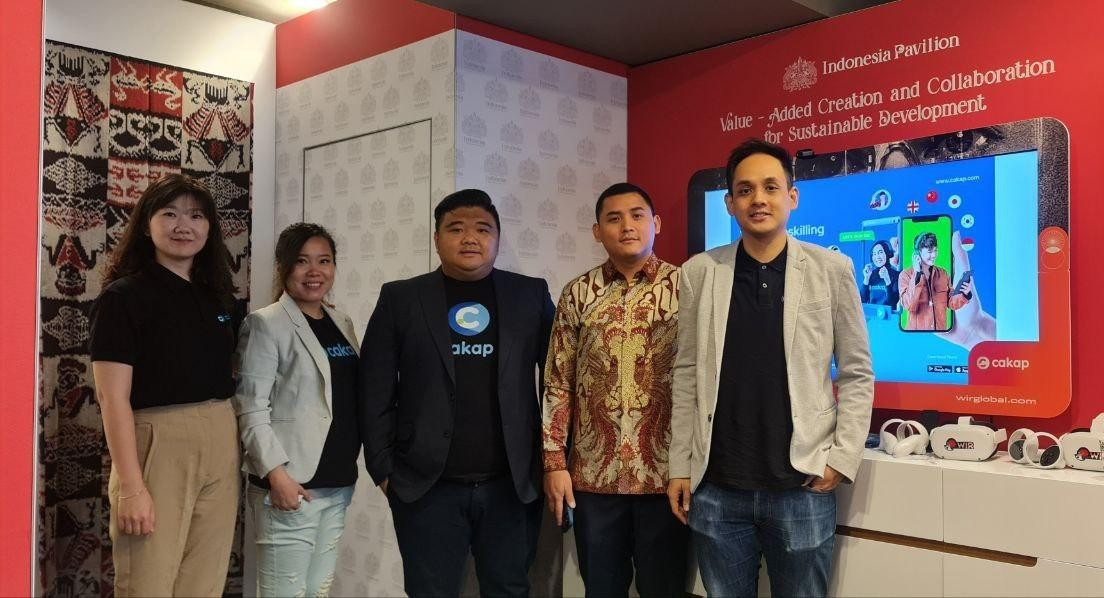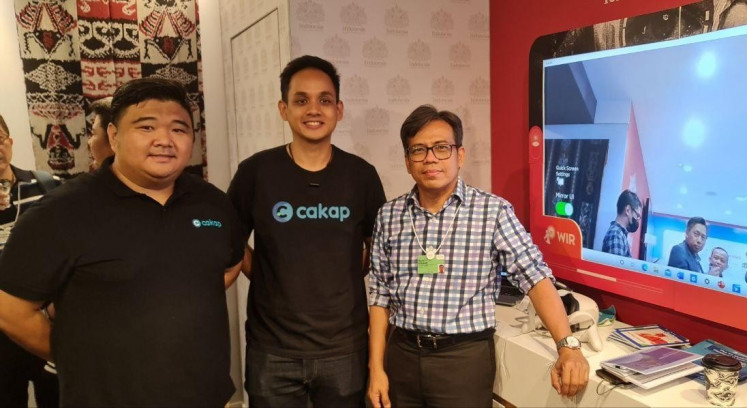Popular Reads
Top Results
Can't find what you're looking for?
View all search resultsPopular Reads
Top Results
Can't find what you're looking for?
View all search resultsEdtech Cakap take part in Indonesia Pavillion, WEF 2022, commits to economic recovery
Cakap to showcase their newest prototype in immersive learning at Indonesia Pavilion in the World Economic Forum 2022 (WEF), Davos, alongside with several top Indonesian companies, supported by The Investment Ministry/Investment Coordinating Board (BKPM).
Change text size
Gift Premium Articles
to Anyone
C
akap to showcase their newest prototype in immersive learning at Indonesia Pavilion in the World Economic Forum 2022 (WEF), Davos, alongside with several top Indonesian companies, supported by The Investment Ministry/Investment Coordinating Board (BKPM). Cakap as the leading upskilling edtech in Indonesia that provides technology-based solutions to address the challenges of educational equality in the country. Cakap’s mission is also in line with Indonesia’s G20 presidency to accelerate national economic recovery.
Cakap has consistently proven its contribution as Indonesia’s leading edtech company, including by participating at Indonesia Pavilion World Economic Forum (WEF) 2022 from May 22 to 26 in Davos, Switzerland.
The WEF is an independent international organization committed to improving the state of the world by engaging businesses, global and regional politics and related industries.
As the WEF meeting involves the world's prestigious economic and business sectors, Cakap is on a mission to strengthen its position as a leading edutech platform in Indonesia that provides upskilling technological solutions in foreign language education as well as vocational education. This is in line with the government's mission to recover the economy following the Covid-19 pandemic.
In education, the WEF is committed to adapting technological changes with education and training systems that aim to prepare individuals as skilled workers. The WEF also states that more than 50 percent of the current workforce will require additional training by 2025. However, another challenge exists in how individuals must adapt to technological disruption in learning.
Tackling these challenges is very much in line with Cakap's plan to improve the competence of Indonesian human resources through upskilling programs.
Tomy Yunus, Cakap CEO and cofounder expressed his gratitude that Cakap could get the opportunity to demonstrate the edtech platform’s success story as regards impacting individuals and the economy.
"The World Economic Forum’s mission in the education sector is to reduce the global skills gap, which applies to Cakap's mission in foreign language learning and vocational classes. We want to improve Indonesian human resources in these skills to increase their global competitiveness," Tomy said.
At the preliminary meeting of the WEF 2022 earlier this year, President Joko Widodo mentioned the three focuses of economic recovery under Indonesia's G20 presidency to optimize digital technology for faster economic transformation.
In the tourism sector, which was severely hit by the Covid-19 pandemic, Cakap has provided training for tourism workers and activists by collaborating with related ministries and business entities.
"In Labuan Bajo, we launched an online English language course for 5,000 tourism workers. Labuan Bajo was chosen because it is one of the national priority destinations supporting tourism recovery," Tomy said.
During the event, Cakap will present virtual classes using augmented and virtual reality (AR/VR), a joint prototype product with WIR Group. The edtech start-up is one of the first to harness AR/VR technology in Indonesia, and Cakap will be demonstrating metacourse, its new prototype interactive class using the latest technologies at the Indonesian Pavilion.
"This shows that Cakap is not only a few steps ahead in terms of technological developments, but is also providing space for users to develop new competencies. We feel the need to voice and show success stories in how Indonesia can address equal distribution of education and improve human resource quality through technology," said Yohan Limerta, Cakap CTO and cofounder.
Meanwhile, after witnessing the signing of an MoU between the WIR Group and Cakap before heading to Davos, BKPM Deputy for Investment Planning Nurul Ichwan welcomed the collaboration of the two technology companies participating in Indonesia Pavillion, WEF 2022.
“This is an opportunity for Indonesia to present a good brand image, especially because the WEF will be attended by stakeholders and relevant businesspeople from the world. Hopefully, the start-ups that we invite to Davos, such as Cakap, will display concrete examples of how technology can be part of recovery and building economic sustainability," said Nurul.
Cakap has served more than 2 million students and covered more than 95 cities in all 34 provinces up to the first quarter of 2022. It also recruited more than 1,400 expert instructors across the country and in several Asia-Pacific countries.
Cakap provides high-quality courses with tailor-made curriculums. As a leading player in the edutech industry, Cakap aims to increase technology adoption through learning experiences while expanding access and opportunities to all regions of Indonesia, including underdeveloped, remote and outermost (3T) regions. It is promoted by establishing public-private partnerships to offer a variety of social impact programs for local communities.











